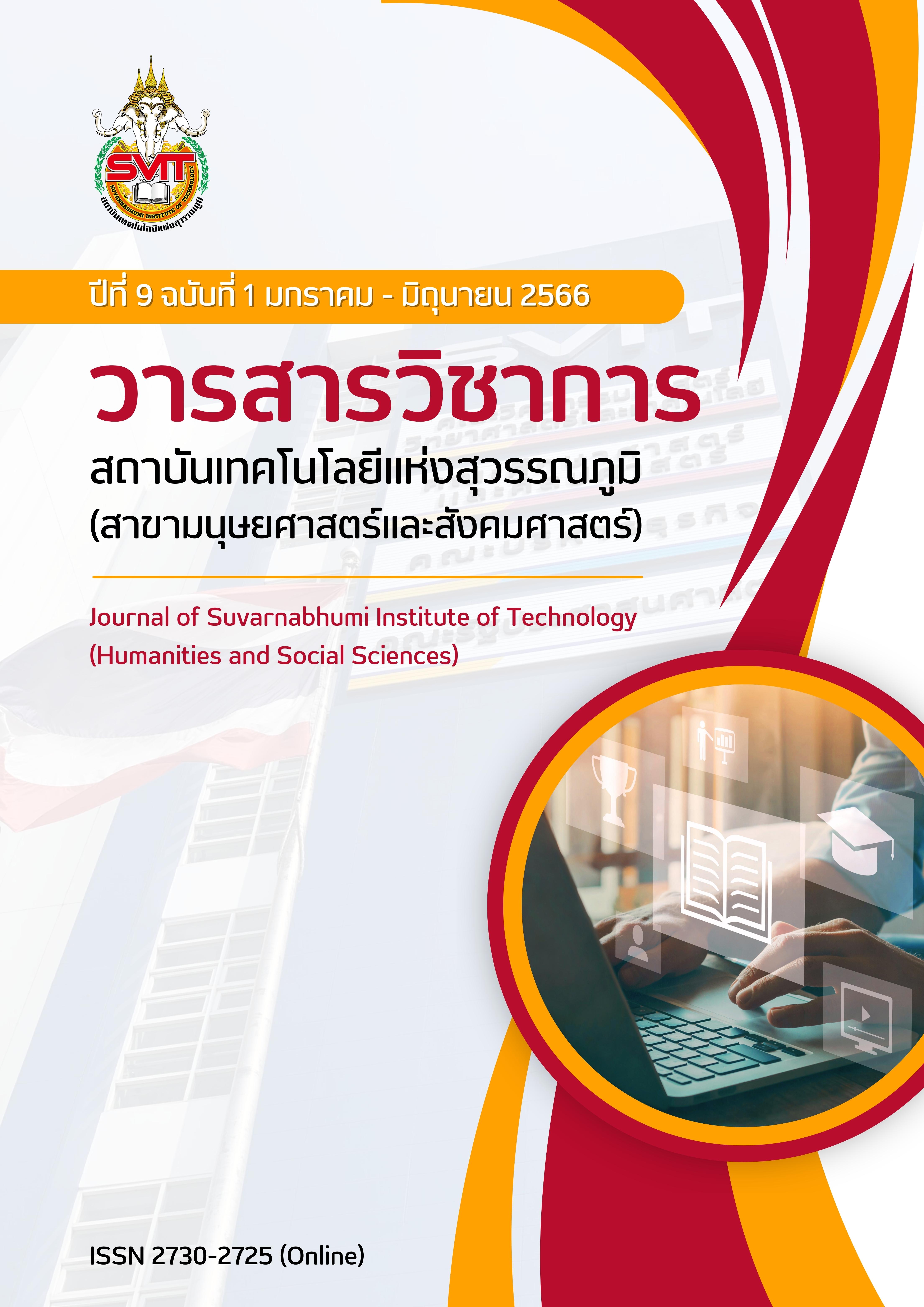BEST PRACTICES OF HIGHER EDUCATION MANAGEMENT FOR AGING SOCIETY
Keywords:
Best practices, Higher education , Aging society, Education managementAbstract
Research study on best practices in higher education management for aging society. The objective of study best practices for educational management of higher education for the aging society, both domestically and internationally. By using a qualitative study methodology by studying the documents and interviews with 5 experts related to education management for the aging society of higher education. Information related to concept and management and planning. Strategies of higher education management for the aging society from 6 countries, namely 1) Japan 2) France 3) England 4) United States of America 5) Singapore and 6) Thailand. Which is found 1) For instructors, should select instructors. Facilitators who have knowledge and basic knowledge of psychology and elderly care. 2) For learners, learning management focuses on the elderly. Study and analyze the elderly enhance knowledge emphasis on activities and hands-on practice, it is measured and evaluated according to actual conditions. There are supplementary activities and performances are shown to encourage students in the elderly group. 3) For executives, there should be networking and cooperation with the public and private sectors. 4) For curriculum, should focus on life courses, professional courses and academic courses, respectively, and 5) For support services, there should be a place and learning materials that are safe enough for the elderly. If comparing the education management system for the elderly in all 6 countries, it was found that the government agencies that hosted learning for the elderly were mostly higher education institutions. For most of the organizations responsible for managing seniors' learning in England and the United States of America, most private agencies manage seniors' learning. While France, Japan and Singapore organized by government and private agencies, but there is also a group of elderly people who are interested in formal education in higher education, which all 6 countries have in common is learning for happiness and focus on learning together between the elderly and students to understanding between the ages this is an experience that many countries and many methods can be applied to Thailand.
References
กรุงเทพธุรกิจ. (2563). 'สิงคโปร์' เตรียมคนสู่อนาคตอย่างไร?. สืบค้นเมื่อ 1 มิถุนายน 2565, จาก https://today.line.me/th/v2/article/YXnj1W
จุมพล ศรีจงศิริกุล และคณะ. (2555). ศึกษามาตรฐานทางกฎหมายของต่างประเทศในการจัดสวัสดิการและสิ่งอำนวยความสะดวกให้แก่ผู้สูงอายุ. กรุงเทพฯ: สำนักงานกองทุนสนับสนุนการสร้างเสริมสุขภาพ (สสส.).
ชิดชงค์ ส. นันทนาเนตร. (2564). การเรียนรู้เพื่อชีวิตสำหรับผู้สูงอายุ หน่วยที่ 10. นนทบุรี: สำนักพิมพ์ มหาวิทยาลัยสุโขทัยธรรมาธิราช.
ณัฐพร จาตุศรีพิทักษ์ และ ประกาย ธีระวัฒนากุล. (2563). 'SkillsFuture' โครงการพัฒนาคนยกแผง ของ 'สิงคโปร์'. สืบค้นเมื่อ 1 มิถุนายน 2565, จาก https://www.bangkokbiznews.com/world/866241
พรทิพย์ จันทร์ตระกูล. (2565). พยาบาลวิชาชีพชํานาญการพิเศษ รักษาราชการแทน ผู้อํานวยการกองแพทย์ เทศบาลนครเชียงราย เลขานุการฝ่ายวิชาการ คณะกรรมการ มหาวิทยาลัยวัยที่สาม นครเชียงราย. สัมภาษณ์
พันธ์ศักดิ์ พลสารัมย์ และ วัลลภา เทพหัสดิน ณ อยุธยา. (2543). โครงการวิจัยเรื่อง การปฏิรูปการเรียนการสอนระดับอุดมศึกษา : การพัฒนาการเรียนรู้ในระดับปริญญาตรี. รายงานการวิจัยเสนอต่อคณะทำงานปฏิรูปด้านการเรียนการสอนระดับอุดมศึกษา ทบวงมหาวิทยาลัย กรุงเทพฯ: บริษัทพิมพ์ดี.
มหาวิทยาลัยราชภัฏภูเก็ต. (2561). มหาวิทยาลัยราชภัฏภูเก็ตออกแบบหลักสูตรผู้สูงวัย ต.รัษฎา เปิด Social Lab บริการท้องถิ่น. สืบค้นเมื่อ 7 มิถุนายน 2562, จาก http://www.pkru.ac.th/th/news/scoop/37-scoop-2/pkru-3-aug-2018
ระวี จูฑศฤงค์ (สัจจโสภณ). (2565). ผู้ช่วยศาสตราจารย์ ภาควิชาการพัฒนาทรัพยากรมนุษย์และชุมชน คณะศึกษาศาสตร์และพัฒนศาสตร์ มหาวิทยาลัยเกษตรศาสตร์ วิทยาเขตกำแพงแสน คณะทำงานจัดทำข้อเสนอแนะเชิงนโยบายการจัดการศึกษาสำหรับผู้สูงอายุอย่างมีส่วนร่วม สำนักงานเลขาธิการสภาการศึกษา. สัมภาษณ์
วิทยาลัยประชากรศาสตร์ จุฬาลงกรณ์มหาวิทยาลัย. (2557). ประชากรไทยในอนาคต. สืบค้นเมื่อ 7 กันยายน 2560 จาก http://www.cps.chula.ac.th
ศิริณา จิตต์จรัส และคณะ. (2560). แนวทางการจัดการศึกษาต่อเนื่องในสถาบันอุดมศึกษาในประเทศไทย. วารสารอิเล็กทรอนิกส์ Veridian มหาวิทยาลัยศิลปากร (มนุษยศาสตร์สังคมศาสตร์และศิลปะ), 10(1), 313-331.
สถาบันเสริมศึกษาและทรัพยากรมนุษย์ มหาวิทยาลัยธรรมศาสตร์. (2561). เปิดห้องเรียน “โรงเรียนผู้สูงอายุ” พัฒนาคุณภาพชีวิตรอบด้านรองรับ Aging Society. สืบค้นเมื่อ 7 มิถุนายน 2562 จาก http://w.tu.ac.th/thammasat-school-for-older-people-and-re-training-course
สำนักงานคณะกรรมการการอุดมศึกษา. (2551). กรอบแผนอุดมศึกษาระยะยาว 15 ปี ฉบับที่ 2 (พ.ศ. 2551-2565). กรุงเทพฯ: โรงพิมพ์แห่งจุฬาลงกรณ์มหาวิทยาลัย.
สำนักงานเลขาธิการสภาการศึกษา. (2561). รายงานการวิจัยเปรียบเทียบเพื่อพัฒนานโยบาย เรื่อง การส่งเสริมการเรียนรู้ของผู้สูงอายุในประเทศไทย. กรุงเทพฯ: บริษัท พริกหวานกราฟฟิค จำกัด.
สุดาพร ปัญญาพฤกษ์ และ ปวีณา ลี้ตระกูล. (2563). แนวทางการพัฒนาการจัดการเรียนรู้สำหรับผู้สูงอายุเพื่อส่งเสริมภาวะพฤฒิพลัง: กรณีศึกษามหาวิทยาลัยวัยที่สามนครเชียงราย. วารสารครุพิบูล, 7(1), 48-61.
สุวิธิดา จรุงเกียรติกุล. (2565). ผู้ช่วยศาสตราจารย์ ภาควิชาการศึกษาตลอดชีวิต คณะครุศาสตร์ จุฬาลงกรณ์มหาวิทยาลัย. สัมภาษณ์
อภิภา ปรัชญพฤทธิ์. (2562). สถาบันอุดมศึกษาที่เป็นมิตรกับผู้ใหญ่และผู้สูงอายุ : ทางเลือกในการปรับตัวเพื่อความอยู่รอดของสถาบันอุดมศึกษาไทย. วารสารร่มพฤกษ์ มหาวิทยาลัยเกริก, 37(2), 67-78.
อาชัญญา รัตนอุบล และคณะ. (2553). การพัฒนาแนวทางการส่งเสริมการจัดการศึกษา/การเรียนรู้เพื่อการพัฒนาศักยภาพผู้สูงอายุ. กรุงเทพฯ: คณะครุศาสตร์ จุฬาลงกรณ์มหาวิทยาลัย.
อาชัญญา รัตนอุบล และสุวิธิดา จรุงเกียรติกุล. (2555). อนาคตภาพรูปแบบมหาวิทยาลัยวัยที่สาม. กรุงเทพฯ: คณะครุศาสตร์ จุฬาลงกรณ์มหาวิทยาลัย.
American Council on Education. (2007). Framing New Terrain : Older Adults & Higher Education. Washington DC.
Cheng & Townsend. (2000). New Paradigm of School Leadership Education in Asia-Pacific Region. Netherlands: Spinger.
Macdonald, K. (2018). A Review of the literature : The Needs of Nontraditional Students in Postsecondary Education. Strategic Enrollment Management Quarterly, 5(4), 159-164.
National University of Singapore. (2018). NUS Lifelong Learners (NUS L3). Retrieved December 27, 2018, from http://scale.nus.edu.sg/AlumniLifeLongLearning
OECD. (2018). Ageing and Employment Policies. Working Better with Age. Retrieved June 30, 2020, from http://www.oecd.org
United Nations Department of Economic and Social Affairs. (2015). Population Division. World Population Ageing. Report 2015.
University of the Third Age. (2000). University of the Third Age. Retrieved October 2, 2017, from http://www.uta.ac.fi
Downloads
Published
Issue
Section
License
Copyright (c) 2023 Suvarnabhumi Institute of Technology

This work is licensed under a Creative Commons Attribution-NonCommercial-NoDerivatives 4.0 International License.
The articles published are copyrighted by the Sarasas Journal of Humanities and Social Science. The opinions expressed in each article in this academic journal are those of the individual authors and do not reflect the views of Sarasas Suvarnabhumi Institute of Technology. The authors are solely responsible for all aspects of their respective articles. Any errors or inaccuracies in the articles are the sole responsibility of the authors.



